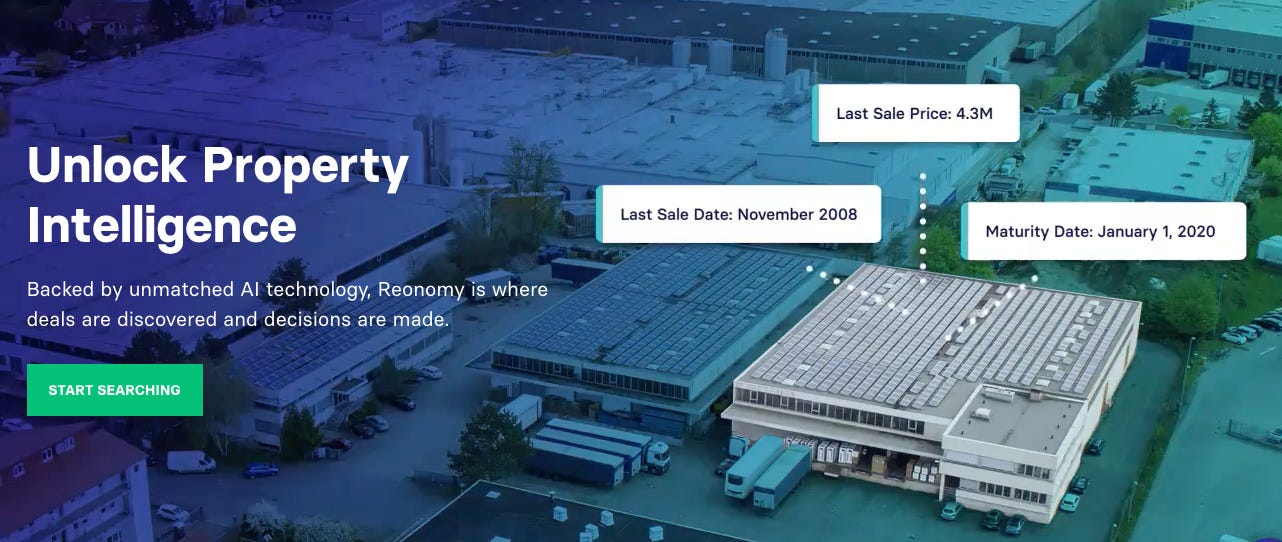In real estate investing few things matter more than acquiring the right property at the right price. The best ways for discovering an exceptional plot or underpriced building are often networking, having the right relationships, and knowing the market better than anyone else (or being extremely lucky). Market knowledge used to be something that could only be obtained by experience, but just like in most other walks of life, modern computing has gradually eroded the advantage that experience brings. The proper taxation of the most frequently traded types of real estate objects is already commoditized and the next wave of real estate market intelligence suites are gaining traction in the market. Undeniably one of the front-runners in this space is Reonomy.
👽 What?
Reonomy bundles a wide variety of data sources both open and proprietary and packages them in an easy to use web-application that can be used as a single platform to discover interesting plots, research them, and follow-up the outreach to the current owner.
The data is getting sourced from a wide network of data providers like ao. dun&bradstreet, Data Axle, title companies, and geospatial firms. This data is given meaning and the correct context by machine learning algorithms. Reonomy even goes further, resulting in predictive analytics which might eg. result in Reonomy detecting the roof needs patching before the owner of the building…
Reonomy focuses on the commercial real estate market. The platform is not only interesting for real estate investors or sales brokers but is also leveraged by service providers to prospect potential partnerships based on specific property characteristics.
imagery courtesy Reonomy
🤷 Who?
Reonomy was founded in 2013 in New York by Richard Sarkis. After 7 funding rounds, Reonomy raised more than $128M from investors like Bain Capital and Softbank. It secured big named clients as JLL, CBRE, and Cushman & Wakefield.
🕵️♀️ Who else?
As real estate markets are highly regulated and data-sources are dependent on the local context of the country one is operating in, we see that most of the solutions are active in a limited number of countries. Caveat… there are a lot of IT consultancy services that could build something similar however in this list we will only include companies in the list with commercially available platforms.
Other providers in the US are:
PROSPECTNOW which both offers a residential and a commercial database and Mashvisor which also focuses on providing solutions for retail investors providing specific rental returns when renting the property out via Airbnb.
In the UK we have:
The London-based Realyse which boasts to have every available dataset on UK residential property included in the platform.
LandTech’s landinsight combines information from different sources to give you an edge in sourcing interesting development sites.
Nimbus Maps is another property Intelligence solution for the UK-market.
Propertydata also seems to have a pretty complete platform, with even a dataset for Georgian Houses which for a non-UK national seems awfully specific.
Spotzi is a platform provider that is active in the Netherlands & Canada. It has marketing solutions, but also solutions specifically designed for the real estate sector.
Also from the Netherlands: Perfect Place helps you find the perfect location for your venture.
In France, we have Kel Foncier that seems to be the most advanced option at the moment.
Datavenues is a Spanish provider of real estate analytics (sorry no English version of the website).
In India, we have Propstack, which is the leading provider for Real Estate data en analytics over there.
In Australia, Archistar.ai seems to have a particularly rich platform. They combine an analytics platform with a generative design tool as we discussed in the proptechaweek on Modelur. This seems a particularly smart fit and could be an indication of how the market will evolve in the future.
👍 Why
This type of technology makes it faster and easier to scout potential investment opportunities, compared to the sourcing of data from disparate sources it removes the need for a lot of menial labor. The saying goes that at this point in time AI and machine learning can achieve anything a competent intern can do, and here, it certainly seems to be the case. Being able to assess a larger number of potential properties to acquire should lead to better results and undeniably provides a competitive edge.
From a societal viewpoint, it allows new challengers to compete with more experienced incumbents which will hopefully lead to a more efficient real estate market. One could even argue that such a platform should be government-provided, at least for the public datasets as it is the inconsistency in the current data sets and lack of overarching vision that makes this kind of platform so difficult to conceive.
👎 Why not?
However, the competitive edge disappears once everyone adopts the same platform using the same data. That is why most of the solutions also provide a way to incorporate additional data-sets, supporting a way to develop a tailor-made solution supporting your specific investment thesis.
Privacy is worth some concern when bringing together big data-sets, specifically as by its nature this type of solutions has addresses at its core, it might be non-trivial to keep it out of the scope of privacy regulations like GDPR or CCPA.
📚 Further reading?
Propmodo: How analytics are transforming property development
FD: Laten we alle bouwlocaties voor woningen nu eens op 1 kaart zetten (dutch)
✨ Things happening
Interesting article in placetech.net on the issues that prevent the value of geospatial data to be unlocked in the UK (but imo just as relevant elsewhere). The NYTimes has a great article on R.P.A automating jobs that seemed to be perfectly safe not so long ago… Pi Labs presented the 5 #proptech startups that will be included in its scale-up program. Interesting weeks ahead…



